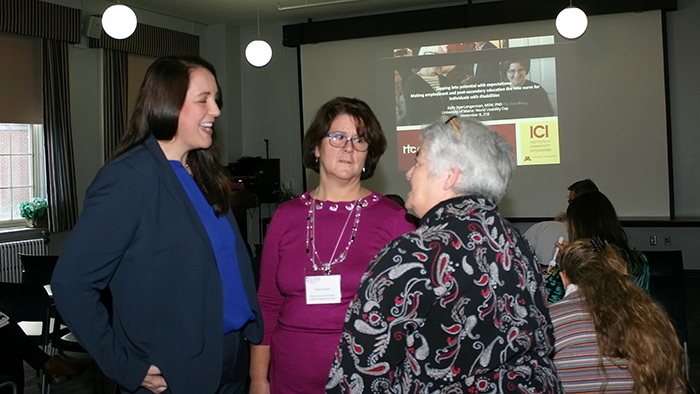
Tapping into Potential: Education and Employment for People with Disabilities
Kelly Nye-Lengerman, Ph.D., a research associate at the University of Minnesota Institute on Community Integration, recently delivered the keynote address for “Equity, Access and Inclusion: A World Usability Day Event” at the University of Maine. Her keynote was sponsored by the University of Maine Center for Community Inclusion and Disability Studies (CCIDS). “We had an opportunity to forge a strong collaboration with the Office of Student Accessibility Services (SAS) on their conference,” said CCIDS director, Alan Cobo-Lewis. Under the leadership of director Sara Henry, SAS serves nearly 800 students with documented disabilities at UMaine.
In the conference keynote, Tapping into Potential with Expectations: Making Employment and Post-Secondary Education the New Norm for Individuals with Disabilities, Dr. Nye-Lengerman discussed how large numbers of people with disabilities can’t access the typical trajectory for economic well-being. “We invest a lot of money. We have a lot of policies that support inclusion or prioritize inclusion. What is it about our educational settings or employment settings that are not making these spaces available or accessible to people with disabilities?”
Nye-Lengerman identified six steps to address the disparities:
- Full inclusion: Make education and employment the new normal. Pursue, support and vigorously defend inclusion for all people.
- Language of expectations: Raise expectations and use words that convey positivity and expectation.
- Presuming competence: People with disabilities can be successful in post‑secondary education and employment.
- Power of experiences: Human beings need experiences, the willingness to try, opportunities to take risk, and a little bit of failure to develop self‑awareness. Offer the same experiences in education and employment to people with disabilities.
- Starting early: Invest in the social‑emotional development of young children and family support.
- Universal design for learning: Make classroom spaces universal so everyone benefits from the different styles of learning students have, with different types of assignments that measure knowledge, skill and ability.
Established in 2005, World Usability Day is a single day that occurs annually around the world and brings together communities of professional, industrial, educational, citizen, and government groups to promote the values of usability, accessibility, and universal design to ensure that the services and products important to life are easier to access and simpler to use.
The University of Maine World Usability Day event (November 8, 2018) was coordinated by the University of Maine Office of Student Accessibility Services. In addition to CCIDS, other partners included the University of Maine Division of Student Life, Center for Innovation in Teaching and Learning, and the Virtual Environment and Multimodal Interaction (VEMI) Laboratory.
Shown in photo above, left to right: Kelly Nye-Lengerman, Susan Russell and Gayla Dwyer.
